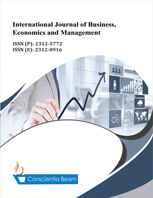The Effects of Macroeconomic Variables on Bank Default: A Case Study in Brazil
DOI:
https://doi.org/10.18488/journal.62.2020.75.310.330Abstract
With the end of the recession from 2014 to 2016, Brazil began a gradual recovery process, with a positive impact on some economic variables — among them, credit financing. Despite this, a robust recovery was not seen in 2019, and 2020 was marked by the arrival of the Covid-19 pandemic, which raises questions about the stability of the financial system and the control of defaults. Considering this, the present study explores how macroeconomic variables affected the default of a financial institution’s credit portfolio between January 2014 and April 2019. To perform this analysis, we built a Vector Error Correction (VEC) model that captured the long-term relationships between the default of different credit products and the selected macroeconomic variables. The results indicate that the macroeconomic variables do in fact impact default, however, this behavior is not homogeneous. In general, different credit products respond in different ways to each of the macroeconomic entities: while part of our findings is in line with others in the literature, we also found surprising results for some of the studied relationships.

